- Home
- Fay Weldon
The Heart of the Country Page 14
The Heart of the Country Read online
Page 14
‘They wouldn’t be allowed to sell it if it wasn’t safe,’ she said.
‘They aren’t allowed to sell it. They just do. Preferably by night, because then the customers think they’re getting a bargain.’
‘It’s just business,’ said Flora. ‘Private enterprise.’
‘I suppose it’s regular employment,’ he said. It was an attempt to cheer himself up, but it didn’t.
‘Just be careful,’ she said, ‘not to get any of it on you.’
She put down her glass and wandered over to her little patch of cultivated garden, where a bumblebee hummed amongst some rather exotic triple tulips. She’d brought the bulbs home from Dunbarton in the brief interregnum between Natalie and Jane. The limey soil at the base of the quarry seemed to suit them, or was it just having their freedom, for now they were out of their plastic pots and into the wild windy spaces, and they were doing very nicely indeed.
Bernard began to laugh.
‘Now what?’ she asked. It was getting dark. The bumblebee buzzed off home.
‘I sold old man Arthur his own blinking bucket back,’ said Bernard.
‘You shouldn’t have,’ she said, and she shivered. ‘You’re too clever by half. It’s unlucky, that kind of thing. Something always comes back and hits you in the face.’
‘You’re soft,’ he said. ‘Daft.’
Arthur took the bucket home to Jane. He thought she’d like it. He’d sold her Victorian-over-Georgian silver teapot the week before and she’d wept. It was a hideous ornate thing but obviously exactly what one particular buyer from Maryland, over on a visit, would pay well over the odds for. Such an opportunity was not likely to come Arthur’s way again for some time.
‘But it looked so nice on the mantelpiece,’ she moaned.
‘It looked terrible,’ he said. ‘And you know it’s stock; only borrowed for the house.’
‘Everything’s stock,’ she said. ‘Everything I like at any rate. You do it on purpose. I expect you think in your heart I’m stock too, and you’d sell me given half a chance.’
He would, too, he thought, but he knew better than to say so. What’s more, you could find a buyer for almost anything in this world, if you just waited. There is almost nothing nobody wants. People would buy half an old shoelace, if they thought it was a bargain, and use it to tie a rose tree to a stake. A lot of people would think Jane a bargain, and he knew it. Loyal and true and concerned.
‘Jane,’ said Arthur, producing the bucket, ‘I thought you might like this. Georgian. Lovely piece of leather work.’
Jane laughed and laughed. Arthur wriggled.
‘You’ve been had!’ she said. ‘Someone’s finally sold you back your own property and you’ve been too greedy to notice. How much did you pay for it?’
‘Practically nothing,’ said Arthur, but he was lying, as we know. As it happened, he had paid well over the odds, being partly afraid, partly admiring of Bernard. The swagger of mirky leather jackets, the gleam of buckles and zips, strike awe and envy into the soft bright elderly. That’s why it’s done.
Arthur didn’t stay in that evening. He said he had to stocktake, and young Sandra Radlett came round to the shop after the bank closed and Jane wept alone amongst her parquet floors. Wives shouldn’t gloat and be nasty, especially when their husband’s professional pride is at stake.
Angus, passing Arthur’s shop that night, saw a light on and knocked. Arthur peered out from the back and, seeing Angus, came out and let him in. Sandra Radlett had just left. She had to be home before her husband. Angus caught a glimpse of narrow skirt and neat legs as she departed. Sandra favoured navy blue, white, pearls and low-heeled shoes. But she had lots of long hair she wore up, the better for her husband (and Arthur, and others) to let down.
‘Stocktaking?’ asked Angus, full of envy.
‘What else!’ said Arthur, and both men laughed.
‘I’ve come about the low image of estate agents, developers and so forth,’ said Angus. ‘WAEADA’s got to do something.’
‘Oh-um,’ said Arthur. ‘What do you really mean?’
‘I mean,’ said Angus, ‘the Young Farmers are backing out of the carnival. They’re sulking about milk quotas.’
‘Quotas kill,’ said Arthur, ‘and all that.’
‘All that,’ said Angus. ‘So there’s a half-built float going cheap. WAEADA can take it over.’
‘Who’s got time to do it?’ asked Arthur. ‘Not me!’
‘You might find time,’ said Angus. ‘Cut down on the extra-curricular activities.’
Arthur owed Angus quite a big favour, what with the sale of Dunbarton, the king-size bed with its memories of Natalie, and so on.
‘I couldn’t do that, Angus!’ protested Arthur. ‘What do I know about carnival floats?’
‘Put the women onto it,’ said Angus. ‘Keep them out of trouble. Give Jane an occupation. Poor Jane!’ He smirked. Arthur writhed. What could he say?
‘Bill Radlett’s a member of WAEADA,’ added Angus. ‘Just joined.’
‘I’d no idea,’ said Arthur. ‘But his wife’s not. That’s the main thing! A carnival float! It’ll cost money,’ he added, hopefully.
‘Waley and Rightly have a Carnival Fund,’ said Angus. ‘As from today. You won’t be out of pocket. You could put Natalie Harris in charge.’
‘Ah,’ said Arthur.
‘Get young Bernard to tow the float up to Avon Farmers,’ said Angus. ‘They can use the spare barn up there.’
‘Is that wise?’ Arthur worried about what was in the sacks. Bernard wasn’t the only one. Everyone has a conscience. Only the sum at which it cuts out differs.
‘Safe as houses,’ said Angus. ‘We’re switching to the orthodox stuff, anyway. Legit growth promoters, cut-price fertilizers, all that. Then we’ll phase out altogether. Someone wants the site for a Garden Centre, come the autumn.’
‘Thank God for that,’ said Arthur, whose land it was, leased to Angus, bought cheap on a lucky impulse some years back.
‘It’s Greenpeace here and Friends of the Earth there and who’s to say they’re not right?’
‘Agitators and alarmists,’ said Angus. ‘What do they know about agriculture? Now Hinkley Point! There’s something to really worry about. If something happens at Hinkley Point what happens to property prices round here?’
Hinkley Point is the local nuclear power station. Various incidents in the past have rendered a number of its concrete pipes twisted and crooked, but British Nuclear Fuels assures everyone this in itself is no kind of hazard and who is to say they are not right? Environmental groups disagree, but then this is in their natures. Local newspapers run the story bottom left on the second page if it happens to come up. But that was where Angus always looked for really significant stories. He wasn’t daft.
Submission
Natalie had finished work for the day. Her second week’s pay packet was in her pocket. The total was twenty-three pounds fifty-six pence, after National Insurance money and tax at the emergency rate had been deducted. She was walking home, since the one bus which passed the quarry gate came at eight minutes before the 6 o’clock siren went, and it was Natalie who was expected to push the button for the siren. It was raining. Natalie wore an old raincoat (two pounds seventy-five pence) and rain hat (seventy-five pence) and a pair of walking boots (one pound twenty-five pence) bought from Oxfam with Sonia’s help. The hat was inadequate and the rain made pasty runnels down her face, where quarry dust still lingered. There was no shower on site, and if there had been it would not have been available to females, in the interests of common decency. The job was terrible. Natalie’s task was to run here and there in the rain with cups of tea and messages, diving for shelter when the dynamite sirens went. Someone else was always there to push those – that was fun. When the sun came out others did the messenging and Natalie was put in the sweltering Portakabin to work the switchboard. Gnarled men clumped about disliking her, and younger, redder ones muttered about women taking the br
ead out of the mouths of family men. Nobody even whistled at her.
Angus’ Quattro drew up beside her. She consented, once again, to get in. She had a blister on her left heel from the boots and from the feel of it the plaster had slipped. Otherwise she would just have shaken her head and walked on. But if she kept walking now she would be in worse pain tomorrow, and if she did not work, she was not paid. On such small choices are our futures determined, and not just ours, other people’s.
‘You can’t go on like this,’ said Angus. ‘Your face is thinner. You’ll get old before your time.’
‘I don’t have much choice,’ said Natalie, but no one likes to hear that time is overtaking them. If you drudge for a living you end up like a drudge. She remembered her mother telling her this, and for the first time for years, years, missed her mother. Tears of frank self-pity came into her eyes.
Angus – he drove casually, one-handed, and at unnerving speed – put his spare hand on her knee.
‘There, there!’ he said, and Natalie felt a rush of not quite affection or dependency, but a kind of sensuous, erotic helplessness.
‘What you need is a man to look after you,’ he said. ‘Heard from Harry?’
‘Of course I haven’t heard from Harry. Have you?’
‘Why should I hear from Harry?’ He sounded surprised.
‘Because I reckon you and Harry made a deal. Harry disappears. Tax man claims: knock the house out to Arthur. Re-sell: split the difference three ways. Reappearance of Harry, tax paid and twenty thousand to the good. And he does you a good turn next time.’
‘There’s a flaw in that somewhere,’ said Angus, laughing. ‘But you’re learning.’
‘What’s the flaw?’
‘We wouldn’t go to all that trouble for so small a sum.’
She didn’t appear convinced.
‘I suppose I should be grateful he didn’t insure my life and then murder me. Just drop me at the gate, Angus. I’m not asking you in.’
‘I don’t want to come in.’ He took two twenty pound notes from his wallet. ‘These are for the kids.’
She stared at the notes and then put them in her pocket.
‘How’s your wife?’ she asked.
‘Much as usual,’ he said. ‘Shall I take you out to dinner tonight?’
‘All right,’ she said, giving in. I think it was the sight of the notes that did it. Up at the quarry she got paid in fivers and pound coins. The sight of large denominations can act as an aphrodisiac. ‘Pick me up at eight.’
She came into my house with the light of treachery, that is to say heterosexuality, in her eyes.
Normally she came in exhausted, white and depleted, and would sit down in a chair, arms and legs dangling like one of Bess’ rag dolls, and let me make her a cup of tea, which she’d drink while the children stared. But on this particular evening she came in quite cheerful and animated, and when she bent her head over the sink to shake the quarry dust out of her hair, it was as if she shook off depression, need, the past, everything. Perhaps it was just having forty unexpected extra pounds in her pocket, but I think it was more the reviving effect that the prospect of an erotic adventure has on women. I should have noticed and known.
Jealous and resentful? Of course I was. Who ever wanted to pounce on me in the hour of my greatest need and offer me a way out? Who ever followed me down country lanes in an Audi Quattro, or lay in wait in the alley behind the International Stores? I deserved good fortune, and got none. Natalie, who turned out to be nothing much better than a whore, deserved nothing and got everything. She left her children for me to look after, while she worked (of course I looked after them: what else could I do!). She had no community spirit: she took a job which fellow feeling with the hard-done-by should have prevented her from taking. She used my house as if it was her own. She used my heart as if it were hers to use and abuse as she felt fit. When it came to it, I just didn’t count. If a man turned up, any obligation to a female friend simply fell by the way. It was inexcusable.
I told her so that evening. She went into the bathroom looking like a Moscow street cleaner and came out dolled up, in a tight black skirt (hers, from the Harrix days) and a frilly white blouse (mine, Oxfam, one pound eighty), and make-up (Marks & Spencer, bought at the school fair for four pence – the blue eyeshadow all gone but everything else okay). She’d washed her hair and towelled it dry so it was curling wildly. She looked terrific. We were meant to be having split peas and sausage for supper. I’d planned it. I’d been soaking the peas all day.
So when she came out of the bathroom I was startled and asked where she was going.
‘Out to dinner,’ she said, without so much as a by-your-leave.
‘You didn’t ask me if I’d babysit,’ I pointed out.
‘I’m sorry,’ she said, not sounding sorry at all. ‘I didn’t think. My two are old enough to leave anyway.’
‘That’s hardly the point,’ I said. ‘I’ve made a special meal for us and now you’re letting me down.’
I shouldn’t have said it. I shouldn’t have been so neurotic. I should just have let her go, happily. I couldn’t.
‘I’m sorry,’ she said. She wasn’t sorry at all. She was embarrassed.
‘I don’t want you to be sorry for me,’ I said. ‘I just want you to have a scrap of feeling for me. But you don’t. You use me, you make use of me, you’ll go out to dinner but you won’t think of taking me. I’m not good enough for you!’
And so on and so on, weeping and wailing. Absurd. The kind of thing wives shriek at husbands, or, I suppose, any spouse or partner of any sex who’s on the losing side. It’s a kind of madness. Every word you utter, claiming love, makes you the more unloveable. The children looked on, trying to puzzle it out. They hadn’t seen me like this, weeping and hysterical, ravenous for love and reassurance, since their father left. They’d almost forgotten. ‘Don’t leave me, how can you, you don’t love me, my life is wasted –’ Did I drive Natalie further into Angus’ arms? Probably.
When she was gone Ben said, ‘Shall I make you a cup of tea?’
During his stay with me he had become a much nicer child.
Seduction
You know how these things go! First the dinner. Angus took Natalie to the Skinflint’s Arms, Wedmore Way, where he thought there wouldn’t be too many friends and acquaintances about, and the ambience was cosy and the food good: that is to say, cooked rather than microwaved. Jean microwaved everything. She was too busy, she said, to do anything else. She would drive to Yeovil on Thursday afternoons (her half-day off), park the car on the double yellow lines outside Marks & Spencer, and stock up with frozen food. If Angus wanted anything different, said Jean, he should buy and cook it himself, particularly the former. She gave the parking tickets to Angus to pay. Angus ate out a lot, which seemed to suit Jean, but not normally in the company of young females. Though he doubted if she would have minded that either. He would have if he could, but he did not possess Arthur’s easy charm. Now, facing Natalie, Angus found his hands trembling as he handed her the menu. He was not as used to this kind of thing as he would have liked.
Natalie ran her eye briskly down the columns, stopping where the numbers were biggest. She had the crab cocktail, the fillet (not the rump) steak, and a crème brûlée. She asked for champagne cocktails to begin with, and Chateau Neuf du Pape ’79 with the meal. She ate ravenously and drank heartily.
‘I’ve been living on lentils,’ she said. He didn’t know what lentils were. How could he?
‘If I’m drunk,’ she said, ‘I can’t help what I do, can I?’
That encouraged him.
He said he had a nice little flat in Wells, going free; a luxury holiday let, overlooking the Market Square. Four bedrooms – ‘Oh, goodie, one for guests’, she trilled – fitted kitchen, bath with shower, heated towel rail – ‘Heated towel rail! Oh, fab!’ (was she laughing at him?) – view of cathedral and fully furnished to the highest standards. A new firm-but-soft Relyon bed in the mast
er bedroom. Jean insisted Angus and she lie on an orthopaedic mattress for the sake of their backs. The only thing that ever gave him backache, he could swear, was lying upon it. ‘Double?’ Natalie presently inquired.
‘Of course it’s double,’ said Angus. ‘There are always double beds in master bedrooms.’ She was laughing at him.
Why? Her eyes were too bright. She kept touching him, speculatively, with her little fingers – more reddened and chapped than he remembered, but then quarry work’s tough, especially when the weather’s bad, and it had been the worst summer in living memory. Bess, Teresa, Edwina, Alice and Ben had all been cooped up together when by rights they should have been out in the garden. If the weather had been better, I reckon Angus’ luxury flat wouldn’t have been so enticing. View of Cathedral is all very well; but the noise! the traffic! Anyway, I blame the weather. I’m tired of blaming people.
‘You can have it free until November,’ said Angus, hedging his bets. ‘I’m not losing out. The tenants paid in advance then never turned up. After that, it’s winter rates.’
‘And by November you might be tired of me,’ observed Natalie. ‘Heigh-ho!’
‘I’ll never be tired of you,’ said Angus, and took her hand next time she touched him. She did not pull it away.
‘The only thing is,’ he said. ‘Will you want to leave your lady friend? Tucked up there so snug and cosy, the pair of you!’
Did she deny me? Did she say I was a fat, garrulous, semi-mad succubus, and she couldn’t wait to get out? Did she say she was driven mad by my lesbian advances? By the shrieks and the rows? No, I don’t think so. I think when he asked that – and ask he had to – she said something like, ‘I’ll be sorry to leave Sonia. She’s been very good to me. It’s just we’re so overcrowded, and what with money being short and the weather so bad – ’
At least I hope so. You have to believe well of at least some of the people some of the time, if you’re going to have the courage to live amongst them. Bill Mempton says sanity is returning. What on earth makes him think that?

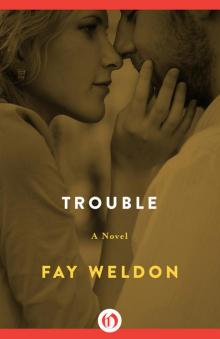 Trouble
Trouble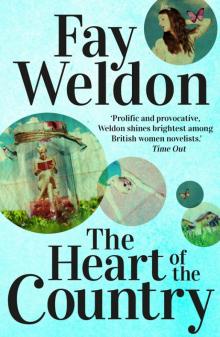 The Heart of the Country
The Heart of the Country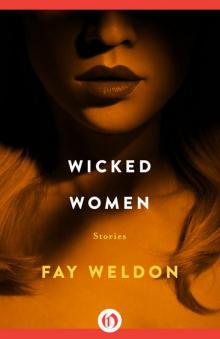 Wicked Women
Wicked Women Mischief
Mischief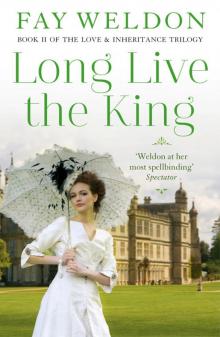 Long Live the King
Long Live the King Remember Me
Remember Me Worst Fears
Worst Fears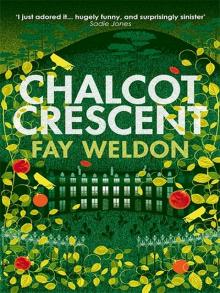 Chalcot Crescent
Chalcot Crescent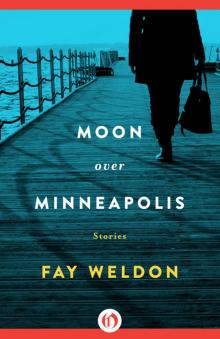 Moon Over Minneapolis
Moon Over Minneapolis The New Countess
The New Countess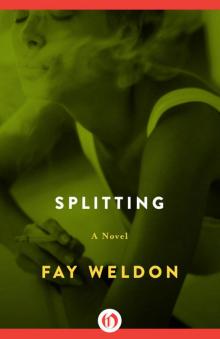 Splitting
Splitting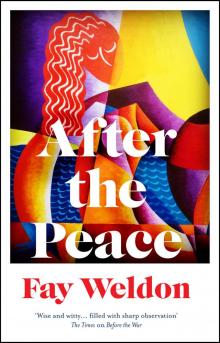 After the Peace
After the Peace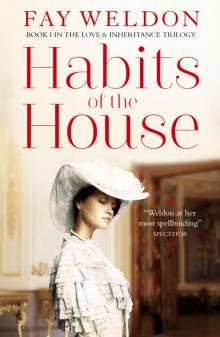 Habits of the House
Habits of the House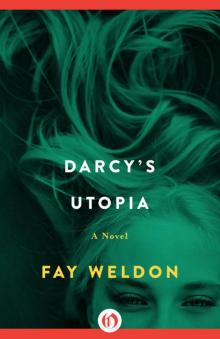 Darcy's Utopia
Darcy's Utopia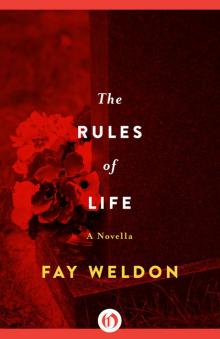 The Rules of Life
The Rules of Life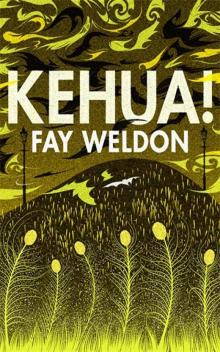 Kehua!
Kehua! Before the War
Before the War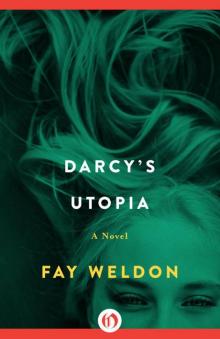 Darcy's Utopia: A Novel
Darcy's Utopia: A Novel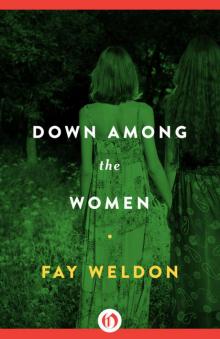 Down Among the Women
Down Among the Women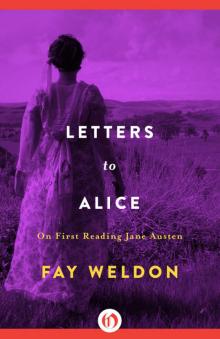 Letters to Alice
Letters to Alice 3 Great Historical Novels
3 Great Historical Novels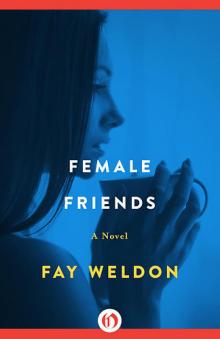 Female Friends
Female Friends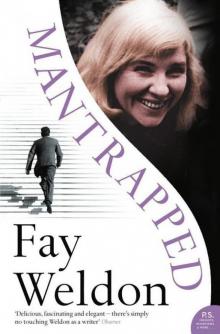 Mantrapped
Mantrapped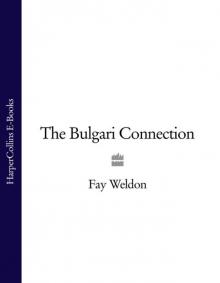 The Bulgari Connection
The Bulgari Connection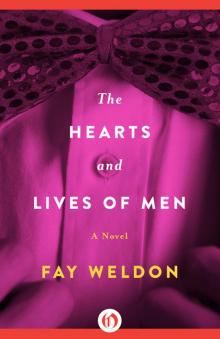 The Hearts and Lives of Men
The Hearts and Lives of Men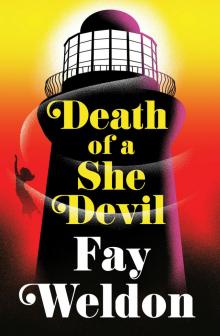 Death of a She Devil
Death of a She Devil